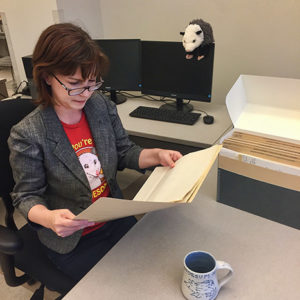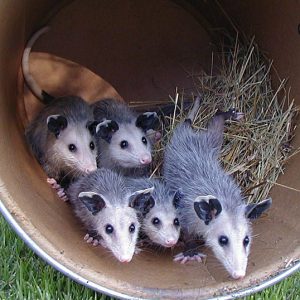calsfoundation@cals.org
The Possum
2017 April Fools' Day Entry
“The Possum” is an 1837 poem written by early Arkansas settler Gammon Lausch—apparently his only work. Although not particularly significant in its own right, it is noted for the apparent influence it exerted upon the much more famous poet and author Edgar Allan Poe, whose poem “The Raven,” published eight years later, copies the general theme and rhyming pattern of “The Possum.” In fact, many scholars have been forced to reevaluate Poe’s own poem in the light of “The Possum”—a work that lingered in obscurity after its publication until its rediscovery in 2014.
Little is known about Gammon Lausch. On the 1840 census, he was listed as a farmer, with his age given as approximately thirty-one. He lived in rural Jackson County just west of Grand Glaise with his wife, Marie, and three children. Aside from “The Possum,” he left behind no other writings, not even a journal that might leave some clue as to his inspiration or creative process. Lausch died on October 7, 1849, after his mule cart overturned, crushing him. Though his death was reported in the local newspapers, no mention was made of his literary output, and many locals likely did not know that he was a published poet. His family stayed in the area, and many of his descendants remain in Arkansas.
“The Possum” was published in the April 1, 1837, issue of the Arkansas Literary Inquisitor, a short-lived monthly journal of essays, fiction, and poetry produced by Albert Pike. The Inquisitor ceased operations two issues later, and there is no indication how “The Possum” was received at the time by local literati. It is also a mystery how a copy of the poem ended up in the hands of Edgar Allan Poe in Virginia, though it is likely that Pike sent copies of his publication to contacts back east. However, the similarities between “The Possum” and “The Raven” are so striking that historian Michael Dougan has dubbed Poe “a damnable plagiarist who polished his own drunken Virginia hide with the pure brain of an Arkansas genius.”
The complete poem is as follows:
Once upon a dark night skunky, while I ambled, li’l drunkee
Back to my lonely cabin from the toilet there outdoor;
At the door, the handle missing, suddenly I heard a hissing
Like some hound dog gently pissing, pissing on my cabin floor;
“T’aint nothin’,” I muttered, “pissin’ on my cabin floor—
I ain’t got a dog no more.”
Ah, vaguely I remember, ’twas about last December
When that damn’d distemper left my mutt all but done for;
Eagerly I tried to reason: “Dog,” I said, “it’s now duck season!
To be sick is treason!” But rise she did no more.
Oh, that rare and radiant hound who my Papaw named Lenore—
Caught a duck, nevermore.
Inside the cabin, my heart hurting and the sounds so disconcerting—
Drunker perhaps than I’d ever been drunk before;
So that now, mixed with the spinning of my head, I was beginning
To think that snakes had taken up home upon my cabin floor;
“That’s the hissin’ sound—a buncha snakes on my cabin floor—
That it is, ain’t nothin’ more.”
With that thought I quick grew sober, dried up like leaves in October—
“Snakes!” said I, “or serpents, y’all can’t be in here no more!
Now I don’t want you ditherin’, you can’t stay on my floor slitherin’;
I don’t want y’all here slitherin’, slitherin’ on my cabin floor!”
To let them out I opened wide my cabin door—
Only dirt and straw—nothing more.
Deep into that darkness staring, long I stood there, wondering, swearing,
Doubting, thinking things I ain’t ever dared to think before;
But the silence lingered on and would’ve lingered ’bout till dawn
As I sat remembering all those happier days of yore—
How I rubbed her belly, right there on that cabin floor—
The belly of my hound, sweet Lenore.
Then into my cabin turning, my thoughts like butter churning,
Soon I heard again that hissing, somewhat louder than before;
“Surely,” said I, “surely that is somethin’ in my mattress
Left behind to cause distress by some jester who broke indoor—
Let me fish it out so I can lie down and have a snore.”
But there was nothing, like before.
At a loss I did stutter, when there did arise a clutter,
And in stepped a mammoth possum of them country days of yore;
Not a tiny one he, not some cute marsupial baby,
But a giant possum, stately, who walked across my cabin floor,
Perched upon a jug of moonshine there on my cabin floor,
Perched, and drank, and nothing more.
Then this swarthy varmint beguiling my sad fancy into smiling,
For I’d never seen a mammal drink like this one had before;
“Your tail and teeth be quite awesome, and you,” I said, “ain’t no blossom—
Drunken, dank, and devilish possum, big as a razorback boar—
More than any other critter, you’d be a hard one to ignore.”
Said the possum, “Got some more?”
T’aint every day here on earth you got a possum at your hearth
Speaking English actually worth a mite more than the guy’s next door;
In my head I couldn’t help seeing, with the help of this mystical being,
Money and riches gleaming—all, in fact, I might ask for!
“Ladies and gentlemen! Come see the talkin’ possum on my cabin floor—
Five cents only, not one cent more.”
But the possum, looking homely, on that empty jug spoke only
Those three words, as if he expected me to have some more;
Not a question did he answer, not even a simple yes or no sir,
But like a noxious cancer all entreaties he foreswore—
“Say somethin’, dammit!” I said. “Speak like you did before!”
Said the possum, “Got some more?”
Wondering if my brain was broken by the words that thing had spoken,
“Doubtless,” said I, “this possum some moonshine does adore
Probably some drunk hillbilly, one day feelin’ oh so silly,
Liquored up involuntarily this critter on the floor,
Made beholden to corn whiskey this possum on my floor,
So that he must drink, evermore.”
This critter was the worst—he got myself now feeling thirsty;
Right swift I scanned my cabin from the ceiling to the floor;
Surely I had another sip or two to leave me feeling chipper,
Perhaps even a full dipper of that likker I might pour!
Ah, I found a flask, took a sip, and straight away I swore—
Only water, and nothing more.
Then I sat engaged in cursing, wanting to be engaged in nursing
Another jug of moonshine, a great corn likker encore;
Now I stood, fiery, fuming, the sight of that damned possum looming—
This critter’s booze-consuming had put my night in full uproar!
Had thrown my quiet, drunken evening straight out through the door—
I could not rest, anymore.
Then I thought the air grew thicker, in my overwhelming need for likker,
So that I continued for a jug or bottle to scrounge for;
“Wretch!” I cried. “I need my whiskey! To be without is wholly risky—
I ain’t feelin’ very frisky—I miss that hound I did adore,
Oh, that sweet and faithful hound my Papaw did name Lenore.”
Said the possum, “Got some more?”
“Varmint!” said I, “thing of evil! Just like the cotton-hungry weevil—
I must warn you now, I ain’t no precious herbivore!
I’ve cooked myself some roasted coon, even eaten breast of loon,
So don’t think yourself immune—at your own risk do you ignore
How much safer you would be if that likker you’d restore!”
Said the possum, “Got some more?”
“Varmint!” said I, “thing of evil! Just like the cotton-hungry weevil—
Rank and rheumy critter, a right regular eyesore!
You yourself are quite the looter—with my gun I’ll me accouter,
And you’ll see I’m quite the shooter when I send you shells galore;
Leave me alone to drink until I forget my hound, Lenore.”
Said the possum, “Got some more?”
This question left me right smarting, so angry now that I was farting—
“Critter,” I shrieked, “you and I ain’t got no kind of rapport!
You come in here and drink my likker, leavin’ me feel all the sicker—
Of mercy I see no flicker in your eyes—oh, possums I now abhor!
Run, you freak, out from my cabin—run right through that there door!”
Said the possum, “Got some more?”
And the possum, never quitting, still is sitting, still is sitting
On the empty jug of moonshine there upon my cabin floor,
And his eyes betray his scheming—I swear that possum’s daily dreaming
Of sweet moonshine o’er him streaming, an endless whiskey store;
That possum’s thirst, so ravenous, the stuff of myth and lore—
Shall be quenched—nevermore!
The poem was rediscovered in 2014 by Shannon Lausch, an archivist with the University of Arkansas at Little Rock and a descendant of the original author, who had come upon the work while researching family history. She published a history of “The Possum” and a comparison of it with Poe’s “The Raven” in the Spring 2015 issue of the Edgar Allan Poe Review. Her article was initially greeted with much consternation and disbelief, with some Poe scholars accusing her of forging “The Possum.” However, subsequent research confirmed the conclusions advanced by Shannon Lausch, establishing the precedence of “The Possum” over “The Raven.” Current scholarship is devoted to exploring the question of how Poe came to acquire a copy of “The Possum” and why he resorted to such obvious plagiarism in this one instance. Not all scholars condemn Poe for his appropriation of “The Possum,” however. As Norman Stafford, professor emeritus of English at Arkansas State University, wrote, “Though this calls into question Poe’s originality, let it not impugn his creativity. After all, Shakespeare stole many of his best lines, too, and improved upon the works from which he borrowed.”
April Fools!
For additional information:
Dougan, Michael. “Oh, Possum!” Arkansas Times, March 2, 2015, pp. 14–15.
Lausch, Shannon. “The Influence of ‘The Possum,’ an 1837 Arkansas Poem, upon Poe’s ‘The Raven.’” Edgar Allan Poe Review 16 (Spring 2015): 1–43.
Stafford, Norman. “Poe’s Prior Possum.” Arkansas Review: A Journal of Delta Studies 47 (December 2016): 163–173.
Virginiana Didelphis
Arkansas Game and Fish Commission
 Literature and Authors
Literature and Authors Louisiana Purchase through Early Statehood, 1803 through 1860
Louisiana Purchase through Early Statehood, 1803 through 1860 Archivist Shannon Lausch Researching "The Possum"
Archivist Shannon Lausch Researching "The Possum"  Young Opossums
Young Opossums 




Comments
No comments on this entry yet.